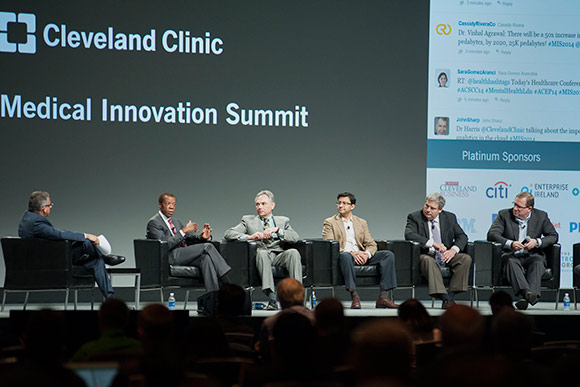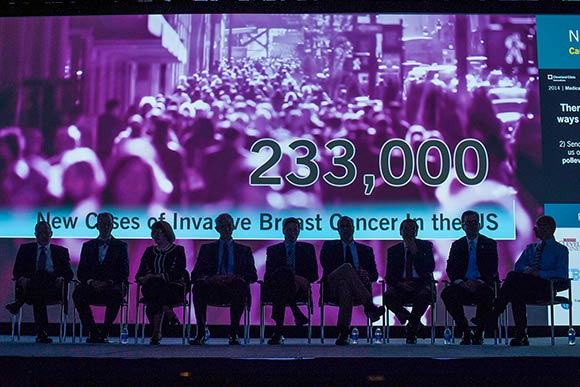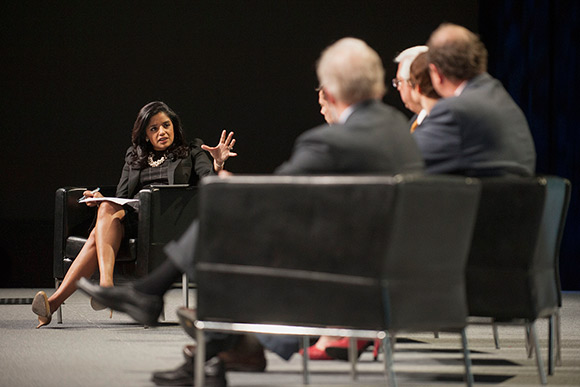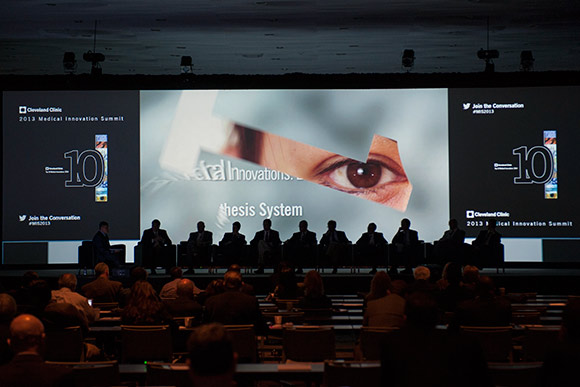Three hot topics to catch at the Medical Innovation Summit
More than 2,000 people will descend on Cleveland October 25th-28th for Cleveland Clinic Innovations’ 13th annual Medical Innovation Summit. The theme this year, “The Neurosciences: Memory. Mood. Movement,” will cover all aspects of the human brain and how it functions and malfunctions.
“The summit essentially is the nexus for most of the players and all stakeholders of the medical ecosystem,” says Tom Graham, the Clinic’s chief innovation officer and this year’s emcee. “This is the center of the medical innovation universe. Cleveland was once an industrial titan, now its healthcare.”
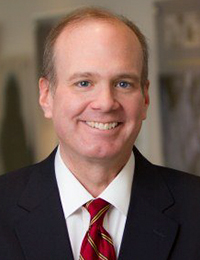 Tom Graham
Tom Graham
Topics in previous years have included everything from cancer and cardiac health to diabetes and obesity. The neurosciences, the function of the nervous system and brain, is a particularly timely topic. “We’re proud of hosting this forum,” says Graham. “We’re really providing a backdrop for this type of discussion in neurosciences.”
While there are plenty of panel discussions, speakers and networking opportunities to choose from over the four day event at the Global Center for Health Innovation in the Cleveland Convention Center, participants should not miss these three discussions around concussions, functional medicine and the cost of healthcare.
Concussions in sports and combat
Whether a middle school student playing football, or pro athlete in the NFL, or a soldier in combat – or even an average person involved in a car accident – the diagnosis, treatment and impact of concussions and brain injuries is at the forefront of neuroscience research these days.
“There’s probably not a topic more in the present than moderate traumatic brain injury,” says Graham. “It affects everyone from football players to heroes that are defending our freedom, so we have more concerns about it. Now those concerns are being talked about in everything from modern media to the cinema and the arts.”
On Tuesday, Oct. 27, the panel discussion “Goal Line Stand: The Future of Understanding & Treating Concussions” will dive into the mysteries associated with treating concussions in an age when there is more emphasis on concussion data collection and innovation than ever before.
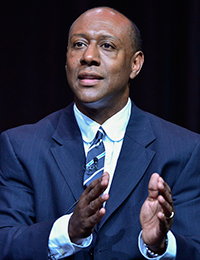 Dwayne Bray
Dwayne Bray
ESPN senior coordinating producer and East Cleveland native Dwayne Bray will moderate a panel of experts and leaders to debate the issue. “Moms in America are deciding at an alarming rate that they don’t want their boys to play football anymore,” says Bray. “I think it’s because of concussion awareness.”
Therefore, Bray says, it’s important to address how to recognize a concussion, treat it and be aware of potential complications. “I work for ESPN and we don’t want to kill football,” he promises. “What’s important is that people need to know, to be aware of what the dangers are and how they can reduce potential dangers.”
When it comes to youth football, Bray says there are some basic things parents should do before enrolling their children in a football program. “Make good choices,” he says. “Know what to look for in a team – who are the coaches and what kind of training do they have.”
The issue extends to the NFL as well, and already the league has taken concussions more seriously. Bray notes that the hit Browns quarterback Josh McCown got a concussion in September during a game against the New York Jets, he was instantly removed and missed the next week because of the NFL’s concussion protocol, implemented in 2013 regarding returning to the game after a concussion.
“With McCown, it was swift,” Bray says. “The coaches and McCown didn’t have a choice with the new concussion protocol.”
That practice was not always the case. “I watched Mike Phipps, Brian Sipe or Bernie Kosar,” says Bray of former Browns quarterbacks. “Those guys took a lot of hits and stayed in the game.”
Graham says the Goal Line Stand discussion is sure to be one of the most popular at the summit. “We’re set to have a vivid interaction around this fertile topic,” he says. “We have a great deal more to learn on this journey of how the brain is affected in participating in contact sports. We have the great ability to look for ways where medical innovation can fill the gaps.”
The panelists include Jay Alberts, director of the Cleveland Clinic Concussion Center; Beth McQuiston, medical director for diagnostics for Abbott; Betsy Nabel, chief medical advisor for the NFL and president of Brigham and Women's Health Care; and Ben Utecht, a former NFL player and spokesperson for the American Academy of Neurology and the American Brain Foundation.
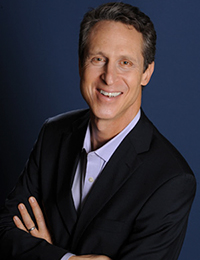 Dr. Mark HymanLooking at the whole body
Dr. Mark HymanLooking at the whole body
While functional medicine -- the practice of treating the whole body and not just looking at individual organs -- has been around for 30 years, it is today gaining ground both in the medical world and with patients.
Mark Hyman, director of the Clinic’s Center for Functional Medicine and founder and medical director of the UltraWellness Center, sees functional medicine as the best approach to treating a variety of ailments – including neurological disorders.
“The functional medicine approach addresses the root causes of chronic diseases, looking at the body as a system, not a group of systems,” Hyman explains. “The body is an ecosystem and everything can be addressed through treating it like one.”
Hyman will serve as moderator for a panel discussion “Functional Medicine in Memory. Mood. Movement” on Tuesday, Oct. 27, in which experts will debate the latest developments in these new approaches to Alzheimer’s, dementia, memory and other age-related brain disorders and functional medicine’s potential impact on the healthcare industry.
Panelists Dale Bredesen, professor at the Buck Institute, and Majid Fotuhi, founder and CMO of NeurExpand Brain Center, will share their expertise. “They are both Alzheimer’s researchers using functional medicine and lifestyle to prevent and reverse dementia,” says Hyman. “We will talk about the system approach, rather than a single diagnosis, a single pathway.”
Hyman cites nutrition and exercise as contributing factors leading to cognitive decline. He refers to Alzheimer’s as the “Type 3 diabetes,” in that early onset symptoms can be reduced by eating foods low in sugar and healthy fats.
Graham sees functional medicine as a route many patients are increasingly looking toward. “Medicine is not just episodic,” he says. “In the pursuit of a healthy lifestyle people are looking more holistically and functional medicine will be the catalyst to bring all this together. “
Who’s paying for healthcare?
With the ever-rising costs of healthcare and medications, many people are often left wondering who is paying for these innovations, and who is making the money? It’s not a simple question to answer. At the panel discussion “Who is Paying for Medical Innovation?” experts from healthcare systems, insurance companies, pharmaceutical companies and venture investors will discuss what fuels the rising cost of today’s modern medicine.
“There’s a real misconception by the public that innovation only makes healthcare more expensive,” says Graham. I think the cost to develop technology, develop devices, can be monetized, but we can’t track the outcomes and the benefits.”
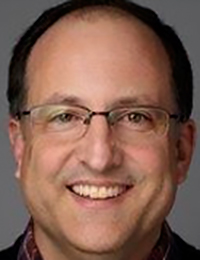 Bob Spurr
Bob Spurr
Bob Spurr, U.S. country head and vice president for patient access and health policy at pharmaceutical developer Novartis Pharmaceuticals, agrees that the advances in healthcare treatments lead to better and longer lives.
“That’s why we do what we do,” Spurr says. “When determining the value of innovation and new healthcare technology, it’s important to look at the cost impact on the total healthcare system. While a new innovative drug treatment may appear to be more costly when compared to older options, you need to think about the bigger picture.”
Spurr points out that advancements in drug treatments can also ultimately reduce costs elsewhere. “The goal with innovation is to develop medicines that represent a meaningful advance where unmet medical needs exist,” he says. “That could mean reducing hospital stays, emergency room visits, lab and physician office visits, and ultimately overcoming disease which may actually reduce total healthcare costs, while increasing the health and quality of life of patients.”
The panel will be moderated by Joe Cunningham, managing partner of Sante Ventures. In addition to Spurr, the panelists are Kirsten Axelsen, vice president of global policy for Pfizer; Harold Paz, executive vice president and chief medical officer for Aetna; and Erik Rasmussen, vice president of government affairs for the American Hospital Association.
Graham stresses that while traditional funding sources for healthcare innovations – the government, institutions, and even the traditional investment community – have drifted away from investing, it is still critical to continue.
“We have to actively seek, at all times, mechanisms where we can fun early stages on innovation,” Graham says. “We provide the pipeline of ideas. We have continued to take ideations and gestate them. Innovation doesn’t happen when a company is ready to be launched.”
There is still time to register for the Medical Innovation Summit.


